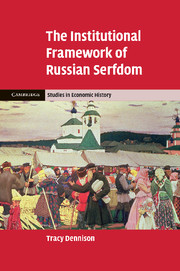Book contents
- Frontmatter
- Contents
- List of figures and tables
- Preface
- A note on the value of the rouble
- A note on transliteration
- List of abbreviations
- Glossary
- Map: Yaroslavl' and surrounding provinces
- 1 Why is Russia different? Culture, geography, institutions
- 2 Voshchazhnikovo: a microcosm of nineteenth-century Russia
- 3 Household structure and family economy
- 4 The rural commune
- 5 Land and property markets
- 6 Labour markets
- 7 Credit and savings
- 8 Retail markets and consumption
- 9 The institutional framework of Russian serfdom
- Bibliography
- Index
- References
7 - Credit and savings
Published online by Cambridge University Press: 03 May 2011
- Frontmatter
- Contents
- List of figures and tables
- Preface
- A note on the value of the rouble
- A note on transliteration
- List of abbreviations
- Glossary
- Map: Yaroslavl' and surrounding provinces
- 1 Why is Russia different? Culture, geography, institutions
- 2 Voshchazhnikovo: a microcosm of nineteenth-century Russia
- 3 Household structure and family economy
- 4 The rural commune
- 5 Land and property markets
- 6 Labour markets
- 7 Credit and savings
- 8 Retail markets and consumption
- 9 The institutional framework of Russian serfdom
- Bibliography
- Index
- References
Summary
The administrative framework that evolved under the Sheremetyevs not only allowed serfs to participate in markets in land and labour, it also enabled them to engage in credit transactions and accumulate savings. Credit markets have at least three important functions: for lenders, they provide opportunities for preserving the value of their savings; for borrowers, they afford a means for smoothing consumption over time, on the one hand, and they supply capital for investment, on the other. Credit markets enable lenders to put unused surpluses to work, while enabling borrowers to consume or invest now and pay later. Until recently, these functions were considered to be of importance only in economically advanced societies of the past century or two. We now know, however, that credit markets are of equal, if not even greater, importance in developing societies.
Rural credit markets in Russia have received even less attention than markets in land and labour. This may be at \least partly due to the paucity of sources; references to credit transactions are not always readily apparent in the archival records for Russian estates. But the neglect of rural credit markets is reinforced by the prevailing view of Russian peasants as dependent on communal institutions for insurance and welfare provision. Through its land-repartitioning activities, the commune is supposed to have guaranteed a minimum level of subsistence to its member households.
- Type
- Chapter
- Information
- The Institutional Framework of Russian Serfdom , pp. 181 - 198Publisher: Cambridge University PressPrint publication year: 2011



